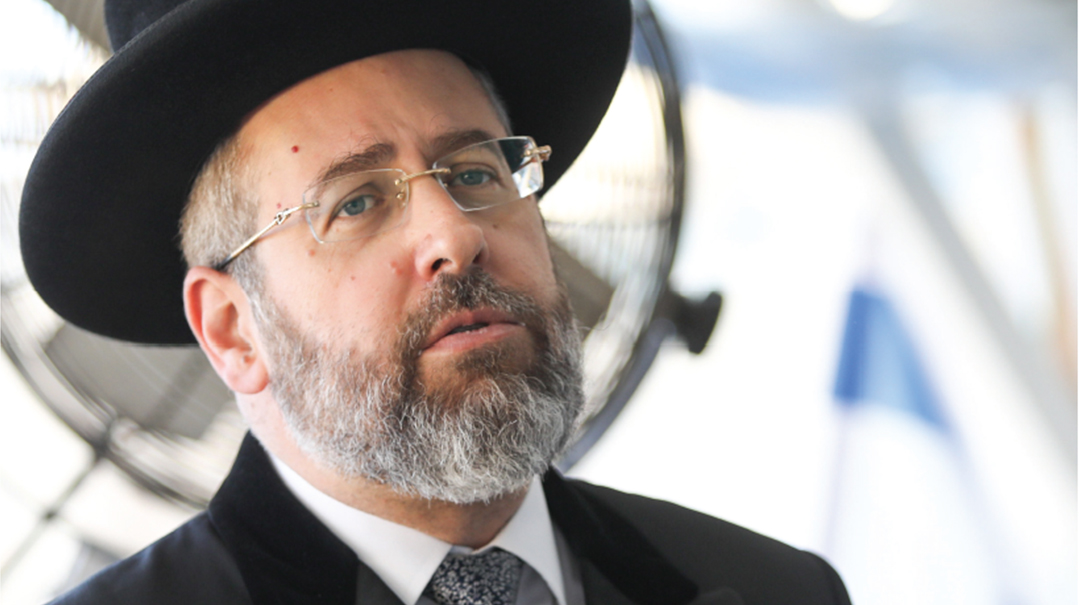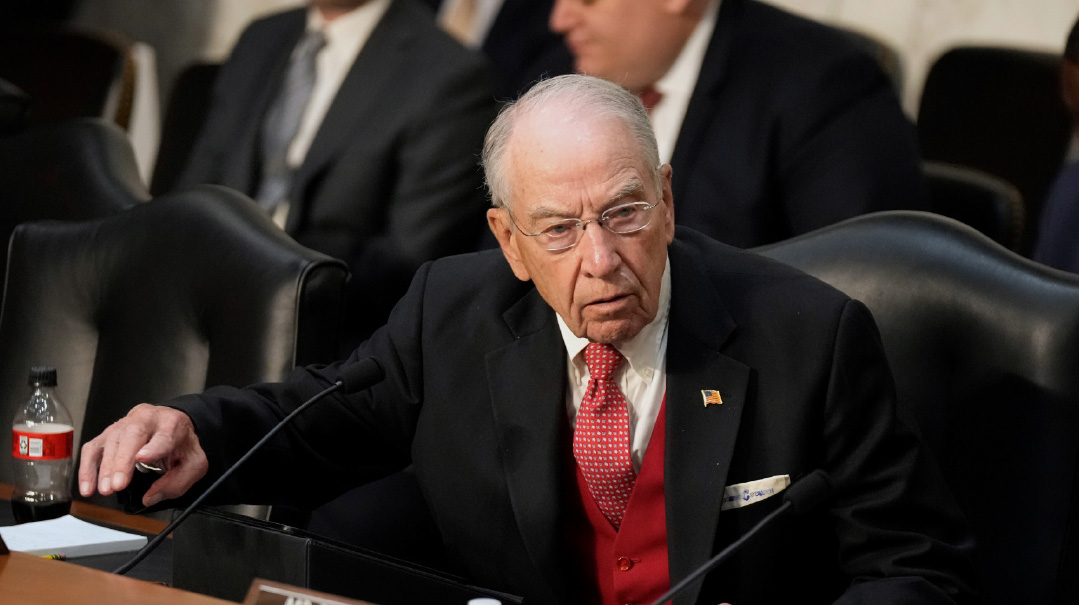Identity Crisis: Face to Face with Chief Rabbi David Lau

In light of the High Court decision recognizing Reform and Conservative conversions, Israel’s Chief Rabbi David Lau speaks out

Photos: Elchanan Kotler
Last week, Israel’s High Court recognized conversions conducted by Reform and Conservative clergy for the first time in history. Israel’s Ashkenazi chief rabbi Rav David Lau reacted to the bombshell decision with pain and disappointment. As the president of the Chief Rabbinate, and as someone experienced in the issues of marriage and conversions , he foresees the precedent-setting decision having troubling implications for the country’s Jewish identity.
But he also highlights the ruling’s limitations. “Without, of course, detracting from the severity of the scandalous ruling, it has nothing to do with marriage and divorce. Its only relevance is determining who is eligible for citizenship under the Law of Return. This is stated explicitly in the ruling, and it is clear that all the state’s dayanim and marriage registries will continue to function according to halachah.”
So what problems does the ruling pose?
“It will allow someone who has undergone a Reform or Conservative conversion to receive immediate Israeli citizenship. The country will then be flooded with people considered halachically non-Jews. Inevitably many Jewish citizens will want to intermarry with them, without even knowing they are not halachic Jews. This ruling basically imports the culture of the United States — with all the ills of rampant assimilation — directly to the Holy Land.
“This begs the question: If Israel enables anyone who wants to come here and get citizenship to do so without a problem, what makes it a ‘Jewish state’?”
Rav Lau cites an incident that occurred last week, in which the parents of nine children underwent a new marriage ceremony after three private individuals decided that their previous kiddushin was not valid.
“When there is an organized system that works according to halachah, the rulings will at times be more lenient or strict — but they will never be arbitrary. When private people take the reins into their own hands, Judaism becomes a circus light years removed from Jewish principles and the Jewish state.”
Know Where You Come From
On a practical level, does the High Court ruling have an effect on marriage registration?
“The High Court ruling relates solely to the Law of Return. Marriage and divorce policies are established by the Chief Rabbinate of Israel, and the country’s batei din work according to these regulations. The High Court judges did not contest that in their ruling.
“However, we’ve found ourselves battling to preserve our halachic standards for quite some time already — because the whole issue of Jewish identity has become much more lax following High Court recognition of conversions abroad, and expedited conversations performed here in Israel, commonly called ‘quickie conversions.’
“Our rule with conversions follows the guidance of Akavia ben Mehalalel: ‘Know where you come from, where you are going, and before Whom you are destined to give a reckoning.’
“ ‘Where you come from’ — what brought you to convert? Do you want to be part of the Jewish nation? Or will you be reaping some type of benefit from conversion?
“ ‘Where are you going’ — will you be able to keep Torah and mitzvos?
“ ‘And before Whom you are destined to give a reckoning’ — do you sense the Creator before you?
“We’ve found that the people conducting these quickie conversions barely know the conversation candidates. The converts who undergo this expedited process often don’t make the necessary lifestyle changes. So these three basic conditions aren’t met.”
Following the High Court ruling, a media personality posted a statement relating that she had converted during her army service but doesn’t currently observe Torah and mitzvos. Is her conversion valid?
“This is a very broad and comprehensive halachic sugya, and I obviously can’t rule on her personal case during this conversation. In general, the yiras Shamayim of the dayanim should serve as a good indicator of whether the process was performed properly, meaning that at the time of the conversion, the convert genuinely intended to observe Torah and mitzvos. If so, then the conversion is valid, even if the convert did not maintain that standard of observance with time. In contrast, if at the time of the conversion the convert had no such intention, the conversion may not be valid. In such a case, an appeal can be submitted.
“We encounter these kinds of cases all the time. There have been times where it emerged that the converts had misled the dayanim, and we had to revoke their conversions. I remember an example of a father and three children who came into Israel as a family, and then it emerged that they were not even his children. The conversion was retracted and they were deported from the country.”
While the High Court ruling does not obligate the dayanim, we’ve heard claims that dayanim will no longer be able to refuse a marriage certificate to a Jew who wants to marry someone halachically non-Jewish, despite having been approved for citizenship as a Jew. Is this in fact the case?
“For years, the directives we have been conveying to the marriage registrars include a clear stipulation not to rely at all on the religion stated in the state-issued ID card. That is because there has been a slow and steady erosion of standards when it comes to Jewish identity. First, the state recognized conversions done in a handful of Reform batei din overseas. Later, they allowed these quickie conversions. And today, they allow anyone who wants to open a beis din to conduct state-sanctioned conversions.
“So for our purposes, the nationality listed on the ID card is not considered a reliable indication of Jewish identity. The marriage registrars at the rabbinical courts will only accept a proper kesubah and a marriage license as proof of the parents’ Jewish lineage. When it comes to olim from abroad, the dayanim verify which rav officiated at the parents’ chuppah in order to ascertain whether they can approve the marriage that he officiated at.
“There is an organized list of rabbanim that every dayan has access to. Some of the rabbanim on that list are approved for conversions but not for marriage registration. Others may officiate at a wedding, but are not approved to authorize a divorce.
“Every rav on our list is assigned a ranking in accordance with his suitability for these sensitive positions. This system will not change even after the High Court ruling this week. No one in the Rabbinate will register a couple for marriage if their circumstances are not in accordance with halachah.”
So what is the concern, what is the reason for the alarm and dismay?
“I am concerned that Eretz Yisrael will be inundated with non-Jews who form relationships with Jews in the nonobservant community. It will be very hard to break these ties. Why bring the assimilation that’s so rampant abroad into the country?”
The End of the Foot-Dragging
Twenty-two years ago, there was a massive demonstration against the High Court. The president of the High Court at the time, Aharon Barak, then spoke with many rabbanim in an effort to lower the temperature. Has current High Court chief Esther Hayut reached out to you at all?
“There have been conversations and they are ongoing. Perhaps that is the reason that the judge stressed in her ruling that the decision does not apply to Jewish law, but rather only to the Law of Return — a note that is certainly unusual in the legal system. She claims that the Knesset dragged the issue out for nearly 15 years without enacting a law on the subject, so the High Court had no recourse but to take the reins and issue a ruling, in absence of a law.”
So you knew that this was coming?
“I’ve been watching the ongoing events in the political sphere and the crises of the recent periods. I imagined that the High Court would decide to issue a ruling after so many years had passed without any progress. I wasn’t surprised.
“I cannot say that we in the Rabbinate agree with this ruling, or with the approach of the Court. But there were discussions held between the Court and the Chief Rabbinate, and I understood from their approach as to where the ruling was heading — meaning, that they would differentiate between halachah and the legal status of the Law of Return.
“Over the years, there were requests to postpone a ruling on this issue, but regretfully, the government provided an answer via the Nissim Commission. The Nissim Commission recommended the formation of a panel of dayanim to oversee conversions. Out of eleven people who would be on the selection committee, it recommended that only two should be the chief rabbis, and the other nine — a large majority — should be representatives of world Jewry or streams of Diaspora Jewry. No one knows who authorized these people to engage in such sensitive decisions, and we cannot sanction these recommendations. In contrast, the conversion system of the Rabbinate employs G-d fearing dayanim who are worthy of their roles.”
Aside from the Rabbinate and its batei din, there are other entities in Eretz Yisrael involved in conversions — private chareidi batei din, and batei din in the religious Zionist sector. What do you think about that? Do we need to aspire to one government-based system, or to give each community its own option?
“I can tell you that the courts of the Rabbinate examine every single case, even those that went through private batei din. There is no doubt that there is a definite advantage to an organized system that doesn’t allow people to ‘go shopping’ and choose the beis din that most suits them. It prevents many mishaps.”
Recently, the High Court has been challenging the Chief Rabbinate in many areas — chometz in hospitals on Pesach, public transportation on Shabbos, and now this ruling on the Reform issue. How can you counter the ongoing violation of the status quo by the High Court?
“There is one significant issue that we must not forget. Over the last 60 years, there has been a public argument in Israel as to whether we are a Jewish state or a state of all its citizens. The ruling this week is in essence the removal of the kippah from the Jewish state. It’s especially painful in light of the fact that throughout the years, there were Jews who dreamed of returning to Eretz Yisrael, to the land that Hashem’s Eyes watch constantly. I really hope that we will be able to deal with the fallout from this ruling, and to explain to the people who live here that it’s worth their while to preserve the halachic framework that obligates every Jew.”
Do you remember a reverse case, where the High Court actually decided to support the batei din?
“Regretfully, I do not remember such a case. There are constantly appeals being filed in the High Court relating to rabbinical courts. In most cases, the High Court does not reject them outright. Sometimes it accepts them, as happened this week, with a delay of about 15 years.”
Shortly after the ruling was made public, the Interior Ministry vowed to overturn it. Did the Rabbinate join the appeal?
“We were not involved, because this appeal did not relate to the halachic facets — only the issues of the actual registration, which falls under the Interior Ministry’s purview. Any question relating to registration [i.e., how a person’s nationality is registered on his ID card] is in the hands of the Interior Ministry.”
There is a fear that this High Court decision will force concerned Israeli citizens to resort to the “nuclear option” — official sifrei yuchshin, records of kosher Jewish lineage. This would be inevitably be viewed as a divisive move by the wider Israeli society. Will that come to pass?
“I hope, pray, and am making every effort that we should not have to come to that.”
(Originally featured in Mishpacha, Issue 852)
Oops! We could not locate your form.













